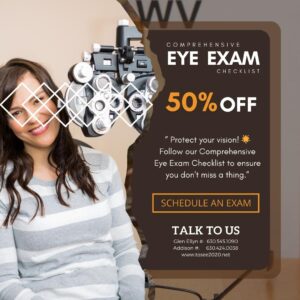The Ultimate Guide to Regular Eye Exams: Why They Matter | Eye Health Insights.
The eyes are often called the windows to the soul and our overall health. Maintaining good vision and eye health is crucial for our daily lives, yet many people take it for granted. Regular eye exams, often overlooked, play a vital role in preserving our vision and detecting potential health issues early. This comprehensive guide will explore the importance of regular eye exams, what to expect during the examination, and why they matter for your overall well-being.
The Role of Regular Eye Exams:
Regular eye exams are not merely about checking whether you need glasses or contact lenses. They serve as comprehensive health evaluations for your eyes and can uncover signs of broader health issues. Here’s why they matter:

-
Early Detection of Eye Conditions:
Eye exams are a primary tool for identifying eye conditions and diseases in their early stages, allowing for timely intervention. Conditions such as glaucoma, macular degeneration, cataracts, and diabetic retinopathy can be detected and managed effectively if diagnosed early. By preserving your vision, you maintain your independence and quality of life.
-
Assessment of Vision Changes:
Your vision can change over time, and these changes may occur gradually, making them easy to overlook. An eye exam helps you stay current with your visual acuity and ensures you have the right eyeglasses or contact lenses prescription. This can significantly improve your daily comfort and productivity.
-
Detection of General Health Issues:
Regular eye exams can uncover general health problems that might not immediately relate to your vision. For instance, diabetes, high blood pressure, and certain autoimmune diseases can be identified during an eye exam. The eyes’ blood vessels, optic nerve, and other structures provide valuable insights into your overall health.
-
Prevention of Vision Loss:
Many causes of vision loss are preventable or manageable when detected early. Vision loss due to conditions like glaucoma or diabetic retinopathy can often be slowed or halted through medical treatments and lifestyle changes. Preventing vision loss helps maintain your quality of life and independence.
-
Customized Eye Care:
Regular eye exams allow your optometrist or ophthalmologist to provide personalized eye care. They can tailor recommendations and treatments to your vision and eye health needs. This ensures your eyes receive the care they deserve, optimizing your visual experience.
When and How Often Should You Get an Eye Exam?
The frequency of eye exams depends on various factors, including age, risk factors, and any pre-existing eye conditions. Here are some general guidelines:
Children and Adolescents:
Eye exams are crucial for children to monitor their vision development and detect potential issues. The American Optometric Association recommends the following schedule:
- First exam at 6 months of age.
- Second exam at age 3.
- Regular annual eye exams start at age 5.
Annual exams are essential for school-aged children and adolescents, as visual changes can significantly impact their learning and daily activities.
Adults:
Adults should continue to receive regular eye exams, with the frequency determined by their eye health and risk factors. General guidelines suggest:
- Every 1-2 years for adults under 60 with no risk factors.
- Annually, for individuals over 60, age-related eye conditions become more common.
- More frequent exams for those with risk factors, such as a family history of eye diseases or systemic health conditions.
Seniors:
Senior citizens 65 and older are at an increased risk of age-related eye conditions. Therefore, they should receive annual eye exams to detect and manage conditions like macular degeneration, cataracts, and glaucoma.
Individuals with Eye Conditions or Chronic Diseases:
If you have been diagnosed with an eye condition or chronic disease, such as diabetes, it’s vital to follow your eye care specialist’s recommendations for the frequency of your eye exams. These conditions may require more frequent monitoring.

What to Expect During an Eye Exam?
Understanding what happens during an eye exam can help alleviate any apprehension. Here’s what to anticipate:
-
Comprehensive Assessment of Visual Acuity:
The first step is a visual acuity test, where you read letters from an eye chart to assess the clarity of your vision. This test determines whether you need corrective lenses.
-
Eye Health Examination:
The eye doctor will use various tools and techniques to examine your eye’s internal and external structures. This includes examining the retina, optic nerve, and blood vessels and checking for signs of cataracts, glaucoma, or other conditions.
-
Tonometry:
Tonometry measures the pressure inside your eye, which is crucial in assessing your risk of glaucoma. It is often done using a gentle puff of air or applying a small instrument to your eye’s surface.
-
Pupillary Reactions and Visual Fields:
During the exam, your doctor will assess how your pupils react to light and your visual fields to ensure there are no irregularities or signs of neurological issues.
-
Refraction Test:
If you require corrective lenses, the optometrist or ophthalmologist will perform a refraction test to determine the prescription for your eyeglasses or contact lenses.
-
Discussion and Recommendations:
Following the examination, your eye care specialist will discuss their findings and offer any necessary recommendations for vision correction, eye health management, or treatment for specific conditions. You will have the opportunity to ask questions and address any concerns.
Conclusion – A Clear Path to a Bright Future:
Regular eye exams are not just about maintaining clear vision; they are critical to overall health care. By scheduling and attending routine eye exams, you can safeguard your sight, detect and manage potential eye conditions, and even uncover broader health issues that might require attention. In the grand scheme of life, a clear and healthy vision is invaluable, enabling us to experience the world’s wonders and navigate its challenges confidently. So, take the first step to preserving your vision and book your next eye exam. A brighter future awaits, and it starts with the clarity of vision.
